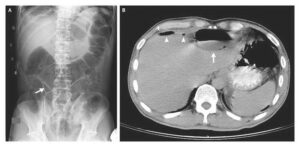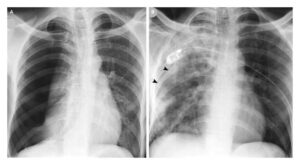A 71-year-old man with cirrhosis presented to the emergency department with severe diffuse pruritus. Three months earlier, he had presented with erythematous and scaly skin on the scalp and hands.
Two skin scrapings had not revealed mites, and he was treated with oral and topical glucocorticoids. After initial improvement, his condition subsequently worsened.
Physical examination now revealed a generalized erythematous and scaly rash with intense hyperkeratotic lesions on the face, neck, interdigital areas, and genital areas.
Microscopic examination of a skin scraping from the abdomen confirmed the presence of mites, and the diagnosis of crusted scabies was made.
Crusted scabies is a rare and severe form of scabies. It is highly contagious because of the large numbers of mites found on the skin. Crusted scabies predominantly affects immunosuppressed patients or those with sensory or motor neuropathy or dementia but can sometimes occur in persons without clear risk factors.
An undiagnosed case of crusted scabies may be the source of an outbreak of scabies in health care and residential facilities.
The patient was treated with oral ivermectin and topical salicylic acid cream, and his symptoms resolved within 2 weeks after presentation.


